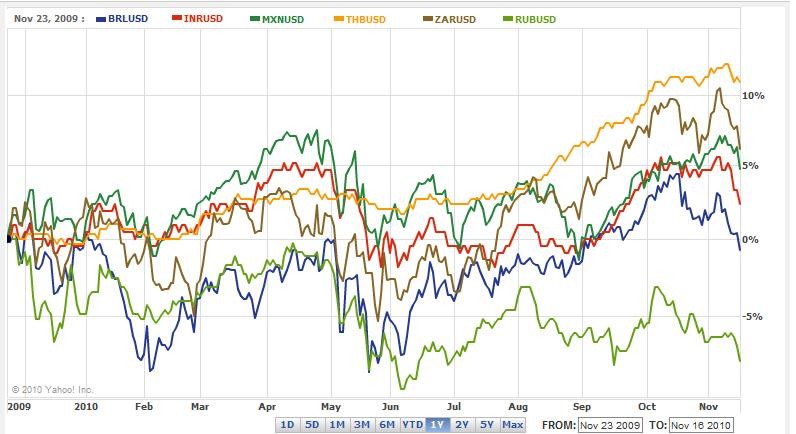Best Stocks for 2014 Bet Against Emerging Markets With EUM
Post on: 24 Июль, 2015 No Comment

Recent Posts:
EUM Bet Against Emerging Markets in 2014
Editor’s note: This column is part of our Best Stocks for 2014 contest. Anthony Mirhaydaris pick for the contest is the ProShares Short MSCI Emerging Markets ETF (EUM ).
For a long time, things were going very right for emerging markets. Emerging markets were riding a wave of industrialization and urbanization fueled by mercantilist currency policies, an army of cheap laborers and eager multinationals looking to boost profits by slashing expenses.
But the jewels of the last bull market (as well as the 2009-11 rebound) are losing some sparkle.
Since the global economy hit an air pocket in 2011 on a combination of the U.S. credit downgrade market scare and a surge of inflationary pressure that forced central banks to tighten (The Federal Reserve ended QE2 while the Peoples Bank of China tightened policy) the fairytale for emerging markets has been slowly ending.
The iShares MSCI Emerging Markets ETF (EEM ) has gone nowhere, down 13% from its peak as it slides sideways.
Why You Should Buy the ProShares Short MSCI Emerging Markets ETF (EUM)
In anticipation of a bumpy 2014 for emerging markets, I recommend investors look to profit from the risks via the ProShares Short MSCI Emerging Markets ETF (EUM ), and have picked it for the Best Stocks of 2014 contest.
There are many problems with the emerging markets story. Just look at China. The job market is tightening as the demographic dividend ends, a consequence of the one-child policy, which China recently updated. A massive credit bubble and infrastructure overbuilding threaten to not only roil the banking system and rattle the housing market, but also are complicating efforts by Beijing to structurally reorient the economy away from export-dependence toward domestic consumption.
And after colonizing Chinas coastal regions before moving into the inner provinces, profit-maximizing multinationals are moving on to greener pastures, such as Thailand and Vietnam.
But above all, its the currency situation and the infidelity of all the hot money inflows that fueled the infrastructure boom that has me worried about emerging markets.
We got a taste of whats to come in May and June: Emerging markets were slammed as the Federal Reserve started talking up a potential tapering of its QE3 stimulus. That bolstered the U.S. dollar and caused a rout in emerging markets currencies such as Indias rupee, which lost nearly 20% against the greenback between May and August. Indian stocks lost 15%.
I think the new Fed taper will act as the spark that catalyzes this dynamic once more. Another dramatic plunge in the Japanese yen should the Bank of Japan desperately launch another currency devaluation/stimulus salvo in February or March, as analysts now anticipate could also contribute.
Stocks in emerging markets have been lagging U.S. averages all year, and the iShares MSCI Emerging Markets ETF is once again threatening to fall through its 200-day moving average as shown in the chart above. A violation would put the 2012/2013 lows back in play for EEM a 10% decline from here. If those levels are violated, there is no significant support above the 2009 bear market lows.
Worryingly, the current situation looks and feels similar to the run up to the 1997 Asian financial crisis. Then, as now, the reversal of hot-money foreign direct investment inflows is a real threat. A rapid increase in debt has fueled asset bubbles, notably in Chinese real estate. A breakdown in the yen is underway once more. And the Fed is poised to tighten monetary policy.
All of that potential tumult makes the EUM fund look attractive for 2014, and should put it among the leaders of the Best Stocks of 2014 contest.
Anthony Mirhaydari is the editor of Edge . As of this writing, he had recommended EUM to his clients.














